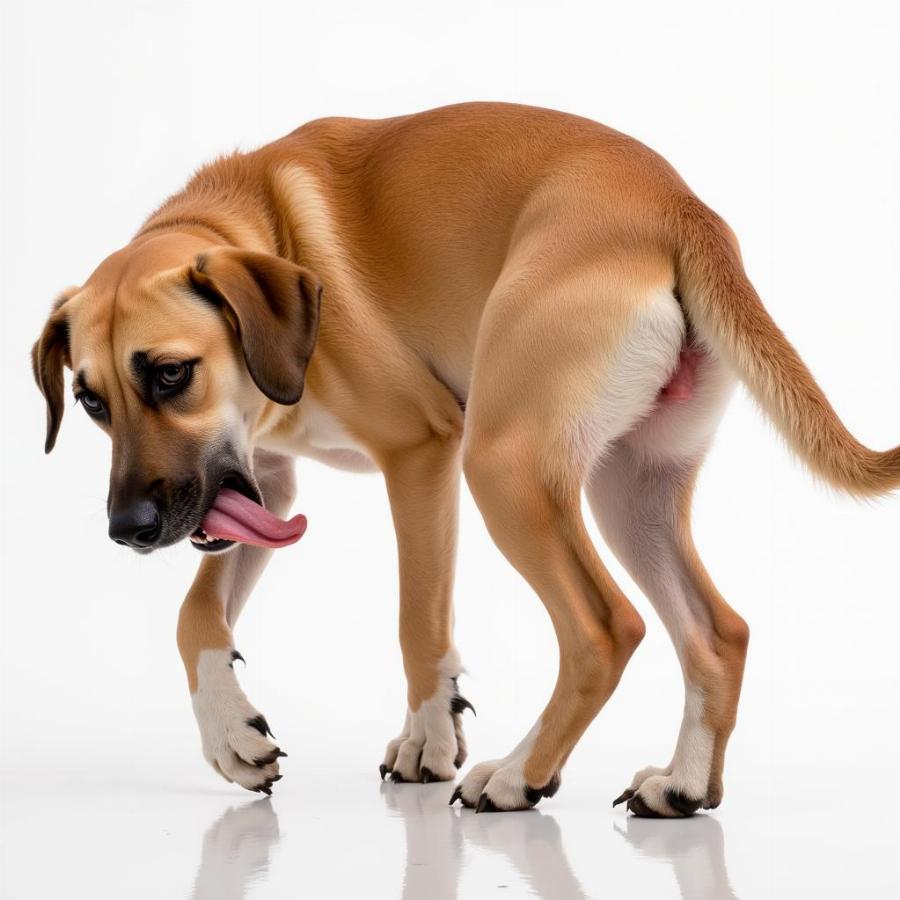Dog ass licking, also known as anogenital licking, is a common behavior that can be perplexing and even concerning for dog owners. While it might seem unsanitary, it’s often a normal part of canine communication and hygiene. However, it’s crucial to understand the underlying reasons behind this behavior to determine whether it’s a harmless habit or a sign of an underlying medical issue. This article will delve into the various reasons why dogs engage in ass licking, how to address excessive licking, and when to seek veterinary attention.
Decoding the Reasons Behind Dog Ass Licking
Why do dogs lick their own or other dogs’ behinds? Several factors can contribute to this behavior. It’s essential to consider each possibility to determine the best course of action. One primary reason is hygiene. Dogs lick themselves to clean areas they can’t reach otherwise, and the anal region is no exception. Glands located in this area release secretions containing vital information about the dog’s diet, health, and reproductive status. By licking, dogs gather this information, essentially “sniffing” with their tongues. Think of it as a unique form of canine communication.
Furthermore, medical reasons can also cause increased licking. Allergies, parasites, infections, and impacted anal glands can all lead to discomfort and irritation in the anal area, prompting the dog to lick excessively in an attempt to soothe the irritation. If your dog’s licking becomes obsessive or is accompanied by other symptoms such as redness, swelling, scooting, or a foul odor, it’s essential to consult a veterinarian.
Addressing Excessive Licking: When to Worry
While occasional ass licking is normal, excessive licking can be a cause for concern. How do you know if your dog’s licking has crossed the line from normal to problematic? Observe your dog’s behavior. Is the licking frequent and intense? Does your dog seem distressed or uncomfortable? Are there any accompanying symptoms? If you answered yes to any of these questions, it’s time to seek professional advice.
 Chó liếm hậu môn quá mức
Chó liếm hậu môn quá mức
Dr. Emily Carter, a renowned veterinary behaviorist, explains, “Excessive licking can be a sign that something is amiss. It’s crucial to rule out any underlying medical conditions before assuming it’s simply a behavioral issue.” Her expertise highlights the importance of a thorough veterinary examination.
Managing the Behavior: Tips and Tricks
If your veterinarian determines that the licking is behavioral, there are steps you can take to manage it. Providing plenty of mental and physical stimulation can help redirect your dog’s focus. Engaging in activities such as playing fetch, going for walks, or working on puzzle toys can tire your dog out and reduce the likelihood of obsessive behaviors.
Furthermore, training can play a significant role in curbing unwanted licking. Teaching commands such as “leave it” can help redirect your dog’s attention when they start to lick excessively. Positive reinforcement, such as rewarding your dog for obeying the command, is crucial for successful training. Consistency is key when it comes to modifying behavior.
Conclusion: Understanding Your Canine Companion
Understanding why dogs lick their behinds is essential for responsible pet ownership. By recognizing the underlying reasons, you can differentiate between normal behavior and potential medical issues. Remember, while occasional ass licking is a natural canine behavior, excessive licking warrants veterinary attention. By providing appropriate care and addressing any underlying problems, you can ensure your furry friend’s health and well-being.
FAQ: Your Dog Ass Licking Questions Answered
- Is dog ass licking always a sign of a problem? No, occasional licking is normal for hygiene and communication.
- When should I be concerned about my dog’s licking? If it’s excessive, accompanied by other symptoms, or seems to distress your dog.
- What can I do to stop my dog from licking excessively? Consult a vet, provide mental and physical stimulation, and consider training.
- Can allergies cause excessive licking? Yes, allergies can irritate the anal area, leading to increased licking.
- How do I know if my dog has impacted anal glands? Signs include scooting, a foul odor, and excessive licking.
More Helpful Resources on Beaut Dogs
Beaut Dogs is your trusted source for all things canine. We offer comprehensive information on dog breeds, care, training, and health. For personalized advice and support, contact us at [email protected]. We’re here to help you navigate the wonderful world of dog ownership.